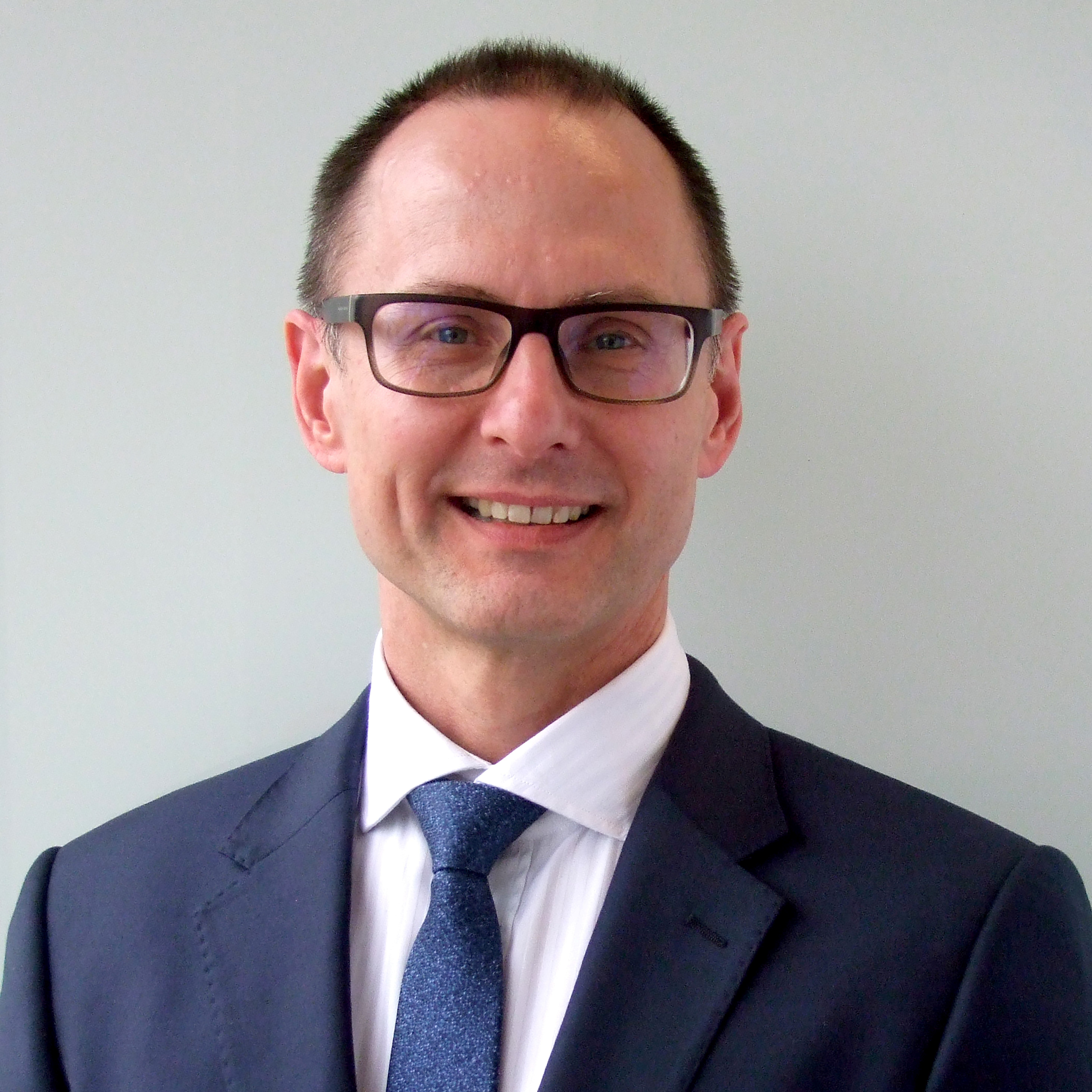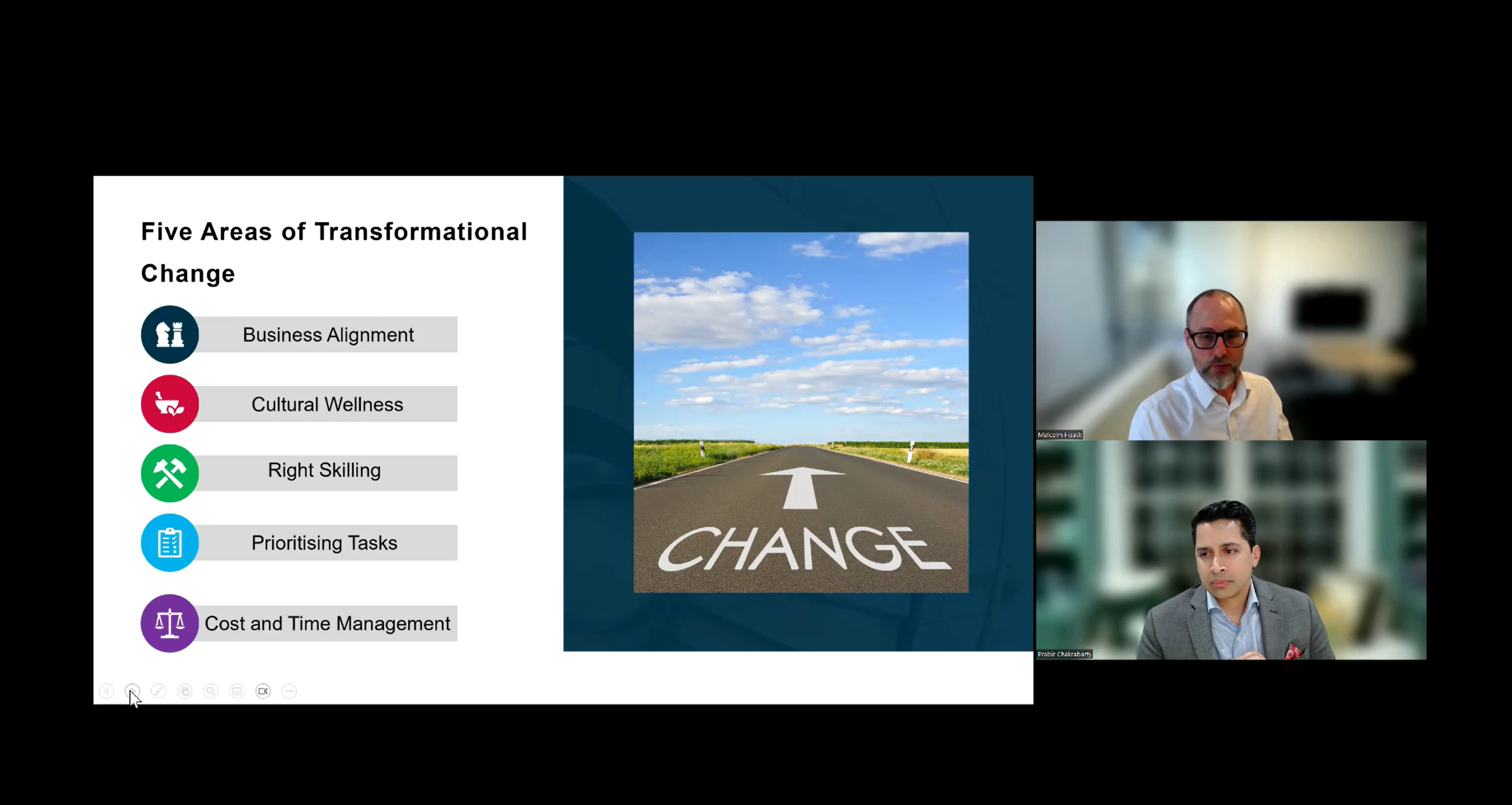Banner artwork by SFIO CRACHO / Shutterstock.com
“Everyone has their own journey. I think we can all achieve what we want to achieve, no matter what hurdles are in front of us.”
- Malcolm Haack

Group General Counsel and Chief Compliance Officer, Orica
Group general counsel and chief compliance officer at Orica — “one of the world’s leading mining and infrastructure solutions providers,” Malcolm Haack acknowledges that his path to in-house practice was an unusual one. In fact, following graduation, the Queensland, Australia native initially attended technical college TAFE and became a qualified hairdresser.
“I wasn’t very good at hairdressing, I must admit,” Haack explained during a recent “InConversation” interview with ACC’s international director of corporate membership and CLO engagement, Prabir Chakrabarty. During this conversation, Haack talked about his unconventional journey to in-house practice; the role of general counsel; and the importance of leaders embracing transformational change, aligning their legal teams with the business, and being OK with becoming “redundant.”
In-house to private practice, and back again
Haack’s interest in law school was rekindled following an encounter with a childhood friend. At the time, he was trying to figure out what to do next, as he knew working in the hair industry wasn’t for him long-term. “I ran into an old friend who had just started law school as a mature age student, which made me rethink about the possibility.” He’d go on to receive his law degree from Bond University, where he was a member of the Law School Association while also working two jobs. One of the jobs, within his law school’s library, would prove to be significant to his studies. He noticed the books and cases the brightest students were studying, and he soon did the same, which allowed him to “leapfrog” in his studies.
Another law school connection led to his first in-house position in Melbourne, a one-year position as a contracts manager on a major government project, before securing his next in-house role at Aurecon. “I only went to private practice when I was about five years out of university,” he explained, going on to note that he made that move because at the time, he felt he needed to broaden his experience. Focusing on front-end drafting and back-end dispute work at a “top tier law firm in Australia,” Haack felt pulled back to in-house practice. “The in-house environment is much more suited to who I am — working hand-in-hand with your client.” He’d go on to work for and manage the legal and ethics & compliance teams of Fortune 500 and ASX100 companies with global footprints spanning Asia-Pacific, Europe, North America, the Middle East, and Africa.
There are risks, and then there’s explosives …
Approaching 28 years of practice while serving as the top lawyer at Orica, which happens to be celebrating 150 years, Haack notes the different training that comes along with supporting the mining/commercial explosives and infrastructure systems provider. “We do fairly regular explosives training,” he explained. “It’s not on the ground, unfortunately, I’ve not yet had the privilege of being on the bench, as we call it, and seeing an explosion.” Although those in the head office don’t get the same exposure as those in the regions, the legal and ethics & compliance team reviews footage of explosions to understand how things work.
According to the global group GC, this practice is essential. “One of the things that is critical to the success of this role, and really in any in-house role, is understanding the business. Therefore, I encourage my team when they get the opportunity to go out and experience an explosion — what it’s like being on the bench.”
The legal and ethics & compliance team at Orica supports a workforce of approximately 11,500 employees and provides services to customers in more than 100 countries. Due to the complex nature of its business, the company is heavily sanctioned and regulated. Therefore, there is a dedicated ethics & compliance team reporting to the group GC, as well as the business conduct and regional company secretariat work.
The role of general counsel and a seat at the table
While Haack agrees that it’s common for the general counsel to report to the CEO and to sit on the executive team, he strongly notes that those GCs (including himself) who do not can and do succeed. His legal and ethics & compliance team consistently achieves the best outcome for the organization. “I make sure that I’m doing what I can to build relationships with relevant stakeholders, including the executive and the board, to ensure that I'm fulfilling my duties and assisting them to fulfill theirs.” Haack has standing meetings with the CEO, regular reporting to the board of directors, and expects his team to be well-versed in the business. “From a flow of information and awareness perspective, there are all the aspects that one would expect.”
GC’s five areas of transformational change
Brought to Orica in part to enhance and align the legal department, Haack came into the role wanting to create a more cohesive and collaborative global legal team. Drawing on his international experience building high-performing teams, he looked at the legal department and thought: “How do we achieve the best outcome for the organization?” He then identified five areas of transformational change: business alignment, cultural wellness, right skilling, prioritizing tasks, and cost and time management. Stating that these basic transformations are likely a part of how many legal departments approach things, he cautions that implementing these practices cannot be looked at as a “short-term project.”
“It’s a continuous evolution fueled by what is happening, because business always changes,” he explained. “We as a legal function need to be able to change and meet the needs of the business. Therefore, these are living and breathing focus areas for us.”
Cultural wellness, which Haack refers to as the importance of ensuring that prospective members of the legal and ethics & compliance team are a good cultural fit for both the function and the company. “Orica is a multinational organization, and we have different cultures in our various offices. It’s critical when we are hiring lawyers, for example, that I understand — through questions of the local management, what the culture is [in that office] — and then recruit for that.”

Equally important when recruiting team members is diversity and inclusion. Reflecting on his experiences working in the Middle East, Malcolm Haack described how the team would problem-solve by “engaging people from different countries, philosophies, and mindsets as this provided a greater breadth of understanding the risks and identifying solutions.”
When it comes to right skilling or aligning those doing the work with tasks that fit their skillsets and positions, Haack recognizes that although a simple concept, sometimes tasks that should be delegated to junior level staff are being done by senior members of the team. “It’s a matter of making sure that we get the right people to focus on right tasks.”
While prioritizing tasks; managing cost and time are self-explanatory, Orica’s legal and ethics & compliance team went a step further and created “swim lanes,” identifying areas of the business that are well-suited to be handled by the team, as well as those that are not. This allows work prioritization, efficiency, and cost savings — while also providing clear and transparent communication between and with business units. And most importantly, the legal and ethics & compliance team can clearly demonstrate value.
Key principles for success
Implementing strategies and processes which improve law department performance, resulting in departmental efficiencies can (and should) reduce workloads and create redundancies. According to Haack, this is a good thing. “If you do that continuous improvement, particularly for work that you are doing day in and day out — work that is repetitive and low value and low risk — looking to improve that process so that in effect, you no longer need to do that work, you are, in some ways, redundant.”
That said, in-house legal teams are the farthest thing from unneeded. “It’s about improving processes so that you can streamline what you’re doing and focus on the important aspects going underground.”
“Going underground” is Haack’s way of saying to emerge yourself in aspects of the business that you may not be as familiar with. Further, strive to really understand the risks faced by the company, as well as how it makes and loses money. “At the end of the day, there will always be legal issues for an organization to deal with, whether it’s done by us in-house or by externals — even up to the point of liquidation or closing an organization — legal will always be involved.”
When asked what advice he has for other in-house counsel, he recommends being courageous and stepping outside of one’s comfort zone. “If you’re an M&A lawyer and you’ve never worked in operations, do that. Challenge yourself to get a better understanding of the business. That’s what I did. I went from being a litigator to a drafter; from living in Australia, the UAE, the UK, and now back in Australia. It’s about challenging yourself and jumping at opportunities.”
Lessons learned and a day in the life
While he figured out early on that salon life wasn’t quite the right fit for him long-term, Haack learned a lot from that experience, as well as observing his parent’s running of a small business — lessons that he still applies today.
“My parents had a flower shop on the Gold Coast. Hairdressing, but probably more so working for my parents, taught me a work ethic.” That work ethic, which began with 4 am wake-up calls to fill flower buckets, continues today — although his early mornings look a bit different now. They include a bit of work before the family rises, making breakfast, and training with his soccer-playing son — all before heading into the office where a day full of meetings and work awaits him. “I find myself on Teams calls with the United States and Latin America in the morning — and evenings split between catching up with work from Europe or spending time with the family.”
Disclaimer: The information in any resource in this website should not be construed as legal advice or as a legal opinion on specific facts, and should not be considered representing the views of its authors, its sponsors, and/or ACC. These resources are not intended as a definitive statement on the subject addressed. Rather, they are intended to serve as a tool providing practical guidance and references for the busy in-house practitioner and other readers.




